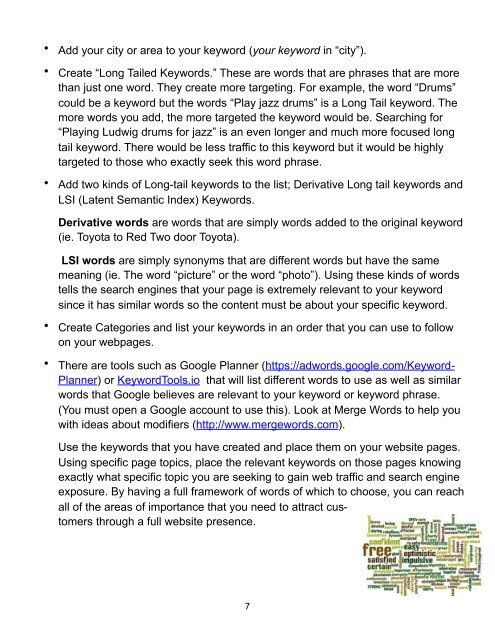You also want an ePaper? Increase the reach of your titles
YUMPU automatically turns print PDFs into web optimized ePapers that Google loves.
• Add your city or area to your keyword (your keyword in “city”).<br />
• Create “Long Tailed Keywords.” These are words that are phrases that are more<br />
than just one word. They create more targeting. For example, the word “Drums”<br />
could be a keyword but the words “Play jazz drums” is a Long Tail keyword. The<br />
more words you add, the more targeted the keyword would be. Searching for<br />
“Playing Ludwig drums for jazz” is an even longer <strong>and</strong> much more focused long<br />
tail keyword. There would be less traffic to this keyword but it would be highly<br />
targeted to those who exactly seek this word phrase.<br />
• Add two kinds of Long-tail keywords to the list; Derivative Long tail keywords <strong>and</strong><br />
LSI (Latent Semantic Index) Keywords.<br />
Derivative words are words that are simply words added to the original keyword<br />
(ie. Toyota to Red Two door Toyota).<br />
LSI words are simply synonyms that are different words but have the same<br />
meaning (ie. The word “picture” or the word “photo”). Using these kinds of words<br />
tells the search engines that your page is extremely relevant to your keyword<br />
since it has similar words so the content must be about your specific keyword.<br />
• Create Categories <strong>and</strong> list your keywords in an order that you can use to follow<br />
on your webpages.<br />
• There are tools such as Google Planner (https://adwords.google.com/Keyword-<br />
Planner) or KeywordTools.io that will list different words to use as well as similar<br />
words that Google believes are relevant to your keyword or keyword phrase.<br />
(You must open a Google account to use this). Look at Merge Words to help you<br />
with ideas about modifiers (http://www.mergewords.com).<br />
Use the keywords that you have created <strong>and</strong> place them on your website pages.<br />
Using specific page topics, place the relevant keywords on those pages knowing<br />
exactly what specific topic you are seeking to gain web traffic <strong>and</strong> search engine<br />
exposure. By having a full framework of words of which to choose, you can reach<br />
all of the areas of importance that you need to attract customers<br />
through a full website presence.<br />
7


